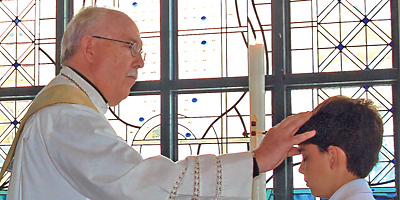
 CHARLESTON—Father Terence K. Fleming, Ph.D., was 25 when he was ordained into the Diocese of Rochester, N.Y.
CHARLESTON—Father Terence K. Fleming, Ph.D., was 25 when he was ordained into the Diocese of Rochester, N.Y.
He said he can’t help smiling when he remembers how in those days — 1967 — he was considered a delayed vocation.
“Now a delayed vocation means you have grandchildren,” he said with a chuckle.
The priest is still a member of the Rochester diocese, but has spent the past four years serving as vice president of mission for Roper St. Francis Healthcare in Charleston.
People may recognize him from television spots for the hospital, or from the many events that take him into the community for outreach and charity.
What old guy?
Full of energy and humor, the priest assures anybody who asks that he’s doing well for an old guy.
But don’t let the old-guy talk fool you. Father Fleming walks with bounce in his step and talks about his love for hospital work with enthusiasm.
Before he came to Charleston, he served as director of pastoral care for hospitals in Florida and New York, with a stint in-between at a large parish in New York. He said being a parish priest is a tough job, and he gives a ton of credit to those who do it.
For him, his parish is the hospital. Father Fleming said he celebrates Mass at the chapel or at home with friends. He also helps at local churches, and has become a regular at Blessed Sacrament.
Despite his time away, though, he still considers Rochester his home. He remains close with his seminary classmates — they just celebrated their 44th anniversary — and exchanges phone calls and visits with them.
Formation
As a boy growing up in New York, Father Fleming attended an all-boys’ Catholic school and his family was involved with the church.
Entering religious life was a natural progression for him.
“My life really centered around priests,” he said. “Between the parish and the high school, I was greatly influenced by priests.”
He laughs at how God’s sense of humor tweaks people sometimes. He had decided not to join a particular religious order because he didn’t want to be a teacher, yet one of his first assignments after being ordained was chaplain and teacher at a high school in New York. Then he was director of campus ministry at State University of New York.
This was in the years following Vatican II, when priests were plentiful, and Father Fleming said it worked out great for him.
For 16 years, he had summers off and dedicated that time to furthering his own education.
“That probably couldn’t happen today because of the shortage of clergy,” he said.
Falling in love
Around 1984, Bishop Matthew H. Clark, from the Diocese of Rochester, asked Father Fleming if he would be interested in hospital work.
He said yes, became a director of pastoral care, and was instantly smitten.
“That’s the profession I fell in love with,” he said. “You dealt with people of every background, the churched and the unchurched, if you will.”
 He said pastoral care is not a proselytizing ministry — that’s a job for parishes — it is a ministry of caring and being present for people regardless of their religion.
He said pastoral care is not a proselytizing ministry — that’s a job for parishes — it is a ministry of caring and being present for people regardless of their religion.
Father Fleming recalled the early days of hospitals, noting that it was not about curing then, but compassion.
“I think it’s important to keep that element alive today,” he said. “Not everything is curable. Sometimes healing is helping people to deal with sickness and death.”
The priest has dozens of stories about the people he has met through the years.
He spoke about an elderly lady who tenderly stroked her husband’s hair and said he was still the most handsome man she knew.
Those are the moments he is able to put everything he knows into practice and use all his skills. He is invited into the lives of the people he meets and is presented with a great ministerial moment, a time to answer the hard questions.
Father Fleming said it is the one time in life that people really expect the church to be present and serve their needs.
Sometimes that means thinking creatively.
When a Native American tribe asked that their tradition of playing drums to accompany their loved one into the next life be honored, Father Fleming found a room where they could do that.
“I like that it’s ecumenical,” he said. “In a hospital setting, you get far more involved in people’s spiritual journey.”
Time for self
Father Fleming said if one is to survive in the priesthood, it is essential to balance work and recreation.
He has traveled, and said one of his brightest moments was visiting the tomb of Pope John XXIII, whom he calls the greatest churchman in the last 100 years.
He is into art, music, reading and likes to walk about an hour a day. The priest also enjoys spending time with his dog, Brit, who was named after St. Bridget of Sweden.
“That little dog has ruled my life for the last 13 years, and has taught me a lot about unconditional love,” he said.

